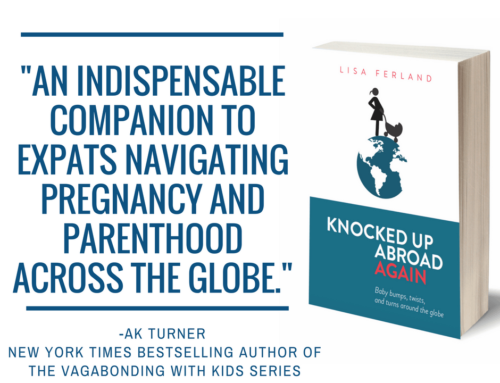As an American, I know that taking a child to any restaurant that doesn’t have it’s menu posted on a wall and ordering her juice while she plays on your phone will get you nasty looks at the least and reported to child services at worst. The US can be a harsh culture in which to go about the day to day activities of parenting. I didn’t know how harsh until I moved to Brazil, and my eyes were opened.
Brazilians are gaga for children!
Women and men, old and young, Brazilians adore kids. Brazil makes the US seem like one giant lawn its crotchety citizens don’t want children stepping on.
I first noticed this difference during a staff lunch at a chic restaurant in Rio. My boss brought her newborn to this very crowded restaurant at peak lunch hour. Exactly one table was available and it was on the opposite of the restaurant. There was a sea of people in expensive clothes and tables covered in glassware between us and that table. When my boss indicated to the staff that we would be claiming that table, I cringed. My stomach clenched at the idea of getting through this fancy crowd with a baby and stroller.
That’s the appropriate response, right? Obviously, a parent should feel ill at the thought of briefly disturbing other people’s lunches on the way to her own table. Ha. How American of me. Two waiters swooped in, all smiles, lifted the stroller up over their heads, and carried that baby like royalty across the entire dining room. Not a single dirty look.
Brazilians have this bizarre assumption that babies and children are a staple part of everyday life. If there are people around, there will be young people and these young people will cry, complain, spill things, talk too loudly, and generally not behave like adults. That’s life. How else is it supposed to continue?
People here also acknowledge kids. They talk to them and include kids as if they were a part of society. Strangers smile and say hello to my daughter on our walks to school. Waiters greet her at restaurants. When she cries in public, people stop and ask her what’s wrong. During a melt down, I’m not worried the stranger approaching is about to helpfully inform me my child is being disruptive or offer some judgement in the form of unsolicited advice. That stranger approaching doesn’t want to talk to me at all. She’s going to console my daughter.
At playgrounds, parents help each others’ kids on and off equipment. They freely offer snacks they’ve brought to every child in earshot. They let other kids run off with their own child’s toy confident it will be returned. Playgrounds in Brazil initially felt to me like loud, sandy communist communes. It was a long time before I stopped apologizing profusely every time my daughter touched another kid’s toy and fearing the wrath of another parent because I offered her child gluten.
If you do bring your baby to Brazil, be prepared. Brazilians love children, and Brazilians are touchy people. I mean literally touchy. They touch other people a lot. A random passersby will want to touch, stroke, kiss, and even hold your baby. One of my daughter’s nurses at the NICU here in Vitoria admitted this was a particular blind spot for Brazilians. Knowledge of germ theory cannot curb their enthusiasm for babies. I dealt with it by reminding myself I’d rather have a request to hold my baby than a request to remove it from the premises.
This habit of baby fawning is not limited to any age, gender, or class. A trainer at my gym once brought his newborn into the weight room and a half dozen of the burliest men were reduced to cooing and clucking incoherently. The school where I taught had preschool through high school, and everyday as the toddlers left the nap room, a crowd of teenagers gathered to squeal and exclaim over the adorably rumpled munchkins.
And of course there are the old ladies. Women over the age 70 must develop a sixth sense to detect babies. I’d be sitting at the cafe, waving a rattle in my daughter’s face, and suddenly an 85 year old woman materialized out of thin air to stroke my daughter’s hair and to tell me my baby is cold.
This is the one sin a parent cannot commit in Brazil. You can leave the TV on 24 hours day. You can feed your kid white rice and french fries at every lunch. But do NOT let your baby get cold!!! If there is a breeze and your baby is not covered with a blanket, every person will stop and tell you your baby is cold. Every. Single. Person. As someone who does not think 65 F requires gloves at any age, I heard it pretty much everyday of my child’s infancy.
The love for and acceptance of children as part of daily life are two of the things I love best about Brazil, and for now, I’m perfectly content to raise my tantrum prone daughter here so as not to disturb my fellow Americans’ lattes.







Hi Brynn, I am American and I also live in Brazil with my Brazilian husband and our daughter! I recently came across your blog and I can’t stop cracking up because, you know, I think the same things every day!
But you are so right about US with kids! I have been to the US twice now with my daughter. The second trip my husband decided that it would be fine for me to go alone with our 10 month old…..NEVER again!!! I think I’m tramatized for life. Let’s just say, I’ve have never been so happy to be back in Brazil! It was really eye opening at how out of touch people were/are about kids in general.
And yes, my daughter was always cold too! Haha! You aren’t the only one! 😉
You traveled alone with a 10 month old? You are one hardcore mama and have my utmost respect. For all of Brazil’s problems, a family friendly culture is NOT one of them. Kids are like celebrities. Everyone says hello to them and wants to talk them. I sometimes feel like my daughter’s bouncer when we’re late to school and all the old people out for the morning walks want to stop and chat with her.
I’m so glad enjoyed the posts! Good luck with your life in Brazil!
Brynn, I’m American and I’m sorry that you feel this way. Perhaps in a larger city children aren’t welcome in some restaurants, but where I live, unless there is a 21+ age limit children are welcome everywhere. I have worked in the food industry for 35+ years and I don’t mind waiting on tables with children, I do mind waiting on tables that don’t take care of their children and leave a huge mess. I think that as parents we need to make sure our kids aren’t screaming throughout the whole visit, or running down the aisles-this is a danger to the child an the server- and if they make a huge mess the parents should clean up before they leave. I always love to see kids, help them place an order etc. If my husband and I want to leave the kids behind or have a quiet dinner we go someplace that kids aren’t allowed. I do think that there are many differences, and the Brazilians seem very lovely with children. I hope that you and your family continue to have a terrific time there, it sounds great!
Brazil has sooooooo many problems that, truthfully, do have us planning to return to the US in the long term, but attitudes regarding children and family are not among them. Of course this post is speaking on a broader cultural level. I think you can see a big difference in attitudes toward children between the US and Brazil at the national policy level i.e. Brazil has mandatory paid maternity and paternity leave; if a child is born in Brazil and is thus Brazilian, then her parents cannot be kicked out of the country because the child has a RIGHT to have its parents. Also among people’s attitudes. Of course, most Americans are lovely towards children. I’ve never had an incident with my daughter. However, all the incidents of breastfeeding moms being shamed or people with crying children actually being kicked off planes or shouted at in theaters (read the comment streams on articles about kids on planes) simply don’t happen with same frequency in Brazil. The fact that the US has a term like “Breeder” to describe parents (which not everyone uses but is used enough people know the connotation) exemplifies the overall differences between the countries. I think the US has a long way to go to being a country that actually “values” family.
I love seeing the differences in the 2 countries from your viewpoint. I have only lived in the USA so I am learning from your posts. It is admirable of the Brazilians to raise their children to know they are loved and valued. I hate that you have ever been in a situation where the kids were not welcome, that really is a sad thing. Children learn from us, and they don’t need to feel as if they don’t belong.
[…] are so many wonderful things about Brazilian culture, like the attitude toward children, the judicial selection process, and dental hygiene. But the way upper classes treat people in […]
Brynn, parabéns por essa visão tão peculiar sobre a way of life dos brasileiros, com seus milhões de problemas sociais, políticos e econômicos, mas com um amor imenso, incondicional e explícito por suas crianças e por suas famílias.
Essa inclusão das crianças na sociedade é algo, realmente, peculiar. Mas não foi sempre assim. A geração dos nossos pais começou essa mudança, fazendo das crianças uma pessoa que deve ser considerada e respeitada em sua individualidade, diferente, portanto de seus pais, irmãos e avós; única, singular e importante.
Mais uma vez, parabéns pela sua análise e pela sua visão crítica e inteligente!
Minha filha, Laura Giestas, foi sua aluna e é sua grande fã.
Um abraço,
Cláudia Giestas
Oi Cláudia, Muito obrigada para seus comentários. Eu adoro a filsofia aqui no Brasil (na suas palavras) “fazendo das crianças uma pessoa que deve ser considerada e respeitada.” Concordo 100%! Vou levar essa filosofia para EUA quando volto.
Acho que você aplicou essa filosofia com Laura porque sua filha foi um dos melhores estudantes na programa de High School. Parabéns, Mãe! 😉
Um abraço para você e Laura!
It takes a village!!!! What a wonderful culture to celebrate a life.
Brazilians certainly have the village philosophy down. Public education not so much, but I’m hopeful that will change someday.
Adorable post! 🙂
Thanks Karina!